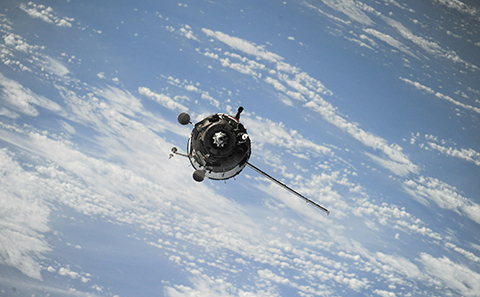
The University of Southampton is leading the first ever study of the environmental impact of satellites burning up as they re-enter the Earth's atmosphere.
Particles and gases – such as aluminium, lithium, chlorine and nitrogen oxide – are released as decommissioned satellites combust when they re-enter the atmosphere.
Research to date has focused on designing satellites that minimise dangers to humans when the debris reaches the Earth's surface, by limiting mass and size. Research has not yet addressed the impact of the by-products from the burning up of decommissioned satellites on the environment and climate.
Dr Minkwan Kim, Associate Professor in Astronautics at the University of Southampton, is leading an international study into the environmental impact of space debris disposal using atmospheric ablation (burning), and to explore how findings can be incorporated into regulations concerning the sustainable use of space.
Dr Kim said: "This topic has never been studied before. The ablation process is complex and we don't yet fully understand how different materials behave during re-entry to the atmosphere. Our project will look at what happens to the elements that are released, where they go, and how they might be affecting our planet's delicate environmental balance. In theory, the particles and gases released could be contributing to ozone depletion and potentially affecting the Earth's ability to regulate solar radiation."
There are thousands of satellites currently orbiting Earth, with up to 50,000 new satellites on track to be launched into orbit by 2030. Over the next 10 years, dozens of satellites will reach their 'end of life' every day, potentially releasing a continuous stream of burnt up materials into the atmosphere.
Ian Williams, Professor of Applied Environmental Science at the University of Southampton, is also on the project team. He said: "We are putting more and more objects into space without really understanding the impact they are having when they reach the end of their lives. It's vitally important we fully understand the impacts to our atmosphere to avoid a repeat of past mistakes that caused such damage to the ozone layer."
Ray Fielding, Head of Sustainability at the UK Space Agency, which is funding the research, added: "I am delighted that we are now in a position to kick off this crucial study on atmospheric ablation, led by the University of Southampton, to complement our portfolio of space sustainability initiatives. The issue was discussed at the 5th Summit for Space Sustainability in 2023 and demonstrates the value of convening targeted global events and taking action on key topics raised."
Research collaborators on the £300,000 project are the University of Edinburgh, Space Forge, Airbus and the US-based Secure World Foundation.






